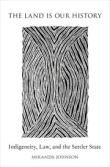AustLit
Latest Issues
AbstractHistoryArchive Description
"The Land Is Our History tells the story of indigenous legal activism at a critical political and cultural juncture in Australia, Canada, and New Zealand. In the late 1960s, indigenous activists protested assimilation policies and the usurpation of their lands as a new mining boom took off, radically threatening their collective identities. Often excluded from legal recourse in the past, indigenous leaders took their claims to court with remarkable results: for the first time, their distinctive histories were admitted as evidence of their rights.
Miranda Johnson examines how indigenous peoples advocated for themselves in courts and commissions of inquiry between the early 1970s to the mid-1990s, chronicling an extraordinary and overlooked history in which virtually disenfranchised peoples forced powerful settler democracies to reckon with their demands. Based on extensive archival research and interviews with leading participants, The Land Is Our History brings to the fore complex and rich discussions among activists, lawyers, anthropologists, judges, and others in the context of legal cases in far-flung communities dealing with rights, history, and identity. The effects of these debates were unexpectedly wide-ranging. By asserting that they were the first peoples of the land, indigenous leaders compelled the powerful settler states that surrounded them to negotiate their rights and status. Fracturing national myths and making new stories of origin necessary, indigenous peoples' claims challenged settler societies to rethink their sense of belonging"–Provided by publisher.
Publication Details of Only Known VersionEarliest 2 Known Versions of
Works about this Work
-
'The Land Is Our History: Indigeneity, Law, and the Settler State' by Miranda Johnson
2017
single work
essay
— Appears in: Australian Book Review , May no. 391 2017; 'Australia’s national identity is as complex as the people who make up the nation and the historical forces by which it was made. Our Indigenous peoples, whose unique histories precede the nation’s by more than fifty thousand years, are central to that identity. A century ago, making those statements would have been virtually unthinkable to most, such was the dominance of exclusionary colonial bigotry. For the mind-space to experience national identity more inclusively, we in the modern era owe much to the extra-ordinary activism of those peoples after World War II. From a deeply comparative and historical perspective, this book narrates and celebrates that activism, which has occurred not only in Australia but also in Canada and New Zealand.' (Introduction)
-
'The Land Is Our History: Indigeneity, Law, and the Settler State' by Miranda Johnson
2017
single work
essay
— Appears in: Australian Book Review , May no. 391 2017; 'Australia’s national identity is as complex as the people who make up the nation and the historical forces by which it was made. Our Indigenous peoples, whose unique histories precede the nation’s by more than fifty thousand years, are central to that identity. A century ago, making those statements would have been virtually unthinkable to most, such was the dominance of exclusionary colonial bigotry. For the mind-space to experience national identity more inclusively, we in the modern era owe much to the extra-ordinary activism of those peoples after World War II. From a deeply comparative and historical perspective, this book narrates and celebrates that activism, which has occurred not only in Australia but also in Canada and New Zealand.' (Introduction)
Awards
-
cAustralia,c
-
cNew Zealand,cPacific Region,
-
cCanada,cAmericas,




